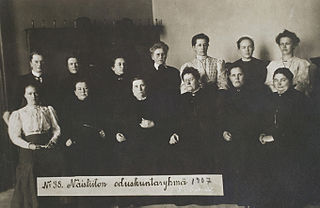 |
|---|
| This article is part of a series on the politics and government of the Netherlands |
Local government |
|
General elections were held in the Netherlands on 5 July 1922. [1] They were the first elections held under universal suffrage, which became reality after the acceptance of a proposal by Henri Marchant in 1919 that gave women full voting rights. [2] Almost all major parties had a woman elected. The number of female representatives increased from one to seven. Only the Anti-Revolutionary Party principally excluded women from the House of Representatives. Another amendment to the electoral law increased the electoral threshold from 0.5% to 0.75%, [3] after six parties had won seats with less than 0.75% of the vote in the previous elections.

The Netherlands is a country located mainly in Northwestern Europe. The European portion of the Netherlands consists of twelve separate provinces that border Germany to the east, Belgium to the south, and the North Sea to the northwest, with maritime borders in the North Sea with Belgium, Germany and the United Kingdom. Together with three island territories in the Caribbean Sea—Bonaire, Sint Eustatius and Saba— it forms a constituent country of the Kingdom of the Netherlands. The official language is Dutch, but a secondary official language in the province of Friesland is West Frisian.

The concept of universal suffrage, also known as general suffrage or common suffrage, consists of the right to vote of all adult citizens, regardless of property ownership, income, race, or ethnicity, subject only to minor exceptions. In its original 19th-century usage by political reformers, universal suffrage was understood to mean only universal manhood suffrage; the vote was extended to women later, during the women's suffrage movement.

The Anti-Revolutionary Party was a Protestant Christian democratic political party in the Netherlands. The party was founded in 1879 by Abraham Kuyper, a neo-Calvinist theologian and minister. In 1980 the party merged with the Catholic People's Party (KVP) and the Christian Historical Union (CHU) to form the Christian Democratic Appeal (CDA).
The General League of Roman Catholic Caucuses remained the largest party, increasing from 30 to 32 seats, whilst the Anti-Revolutionary Party increased from 13 to 16 seats, and the Christian Historical Union went from 7 to 11 seats. [4] The right-wing Christian Democratic Party and the Christian Social Party both lost their sole seats, disappearing from the House, while the Reformed Political Party (SGP) won a seat. The SGP, an orthodox Protestant party established in 1918, was opposed to the co-operation of the Protestant ARP and CHU with the Catholics.

The General League of Roman Catholic Caucuses, informally called the General League, was a Catholic political party in the Netherlands. It is one of the ancestors of the Christian Democratic Appeal, currently a major party in the Netherlands.

The Christian Historical Union was a Protestant Christian democratic political party in the Netherlands. The CHU is one of the predecessors of the Christian Democratic Appeal (CDA), into which it merged in September 1980.

The Christian Democratic Party was a Dutch left-wing Christian-democratic political party. The CDP played only a minor role in parliament. It is historically linked to both the Labour Party and the Christian Democratic Appeal.
The Social Democratic Workers' Party lost two seats, [4] whilst left-wing splinter parties also suffered losses, and went from four to two seats.

The Social Democratic Workers' Party was a Dutch socialist political party and a predecessor of the social democratic Labour Party.
Several liberal groups had merged in 1921 to form the Liberal State Party, but lost further seats as they were reduced from fifteen to only ten. However, a new Liberal Party led by the 85-year-old Samuel van Houten, won a seat. Van Houten himself did not take the seat, which was instead occupied by his representative, Lizzy van Dorp.
The Liberal State Party, "the Freedom League", was a conservative liberal political party in the Netherlands from 1921 to 1948. It is historically linked to the People's Party for Freedom and Democracy (VVD), a major Dutch political party.

The Liberal Party was a Dutch conservative liberal political party. The LP played only a marginal role in Dutch politics.

Samuel van Houten was a Dutch liberal politician, who served as Minister of the Interior from 1894 to 1897.
The Free-thinking Democratic League maintained, against most expectations, their five seats, whilst of the remaining splinter parties, only the Peasants' League was able to survive, rising from one to two seats.

The Free-thinking Democratic League was a progressive liberal political party in the Netherlands. The VDB played a relatively large role in Dutch politics, supplying one Prime Minister, Wim Schermerhorn. The League is a predecessor of two of the major Dutch political parties, the conservative-liberal People's Party for Freedom and Democracy (VVD) and the social-democratic Labour Party (PvdA). The social-liberal Democrats 66 also claims that it and the VDB are ideologically connected.

The Peasants' League was a Dutch agrarian political party. The League played only a minor role in Dutch politics.
After a relatively short formation, the second Ruijs de Beerenbrouck cabinet was formed, with largely the same composition as the previous one.






